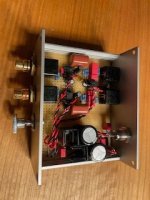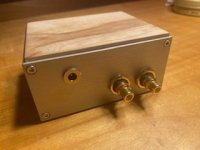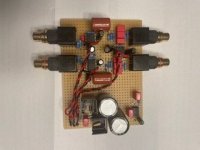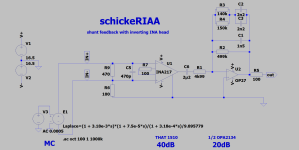MC phono preamp / shunt feedback with inverting INA head
EDIT: actual schematics see post #28
i just finished the first prototype of my phono stage design 😎
the last years i primaly used MC pickups, so the idea was to build a phono pream dedicated to MC, not the usual MM with head amp. important for me:
the opamp is a JFET type. i tested also a LM4562, but it realy didn't sound as good in this position.
power supply is pretty standard, delon voltage doubler, LM317/337.
Thomas
EDIT: actual schematics see post #28
i just finished the first prototype of my phono stage design 😎
the last years i primaly used MC pickups, so the idea was to build a phono pream dedicated to MC, not the usual MM with head amp. important for me:
- DIY friendly, i.e. through hole parts, easy to source, low parts count
- good compromise between noise and headroom
- proper RIAA acuracy
the opamp is a JFET type. i tested also a LM4562, but it realy didn't sound as good in this position.
power supply is pretty standard, delon voltage doubler, LM317/337.
Thomas
Attachments
Last edited:
Please find attached the schematics of the modification i implemented the last days.
I use a standard unbalanced cinch connection to the turntable. the first version used a balanced input network based primaly on the that 1510/1512 datasheet for microphone preamps. for a phonopreamp it makes more sense to connect the ground as suggested by bob cordell.
the next days i will replace the delon voltage doubler by a standard split power supply.
there are two more possible improvements to investigate:
both points require a new prototype, i think i will start with the giwland current source
I use a standard unbalanced cinch connection to the turntable. the first version used a balanced input network based primaly on the that 1510/1512 datasheet for microphone preamps. for a phonopreamp it makes more sense to connect the ground as suggested by bob cordell.
the next days i will replace the delon voltage doubler by a standard split power supply.
there are two more possible improvements to investigate:
- use the elvee tandem regulator instead of LM317/337
- add an additional opamp buffer per channel to transform the INA into a improved howland current source as suggested in a TI application note. this will completly decouple the input from the ground. it requires a double opamp per channel, but layout will remain compact because both inputs if rhe two opamps of the chip share the same signal.
both points require a new prototype, i think i will start with the giwland current source
Attachments
Is that what you mean to transform the Opamp buffer to an improved howland current source?
I made this phono-stage many years ago and reactivated it some time ago out of necessity and I was surprised how good it sounds.
Amplification is determined by R12 for the INA and R13 for the Howland current source in conjunction with the impedance of the RIAA network.
INA is SSM2019 and OPA is OPA2604

I made this phono-stage many years ago and reactivated it some time ago out of necessity and I was surprised how good it sounds.
Amplification is determined by R12 for the INA and R13 for the Howland current source in conjunction with the impedance of the RIAA network.
INA is SSM2019 and OPA is OPA2604
SSM2019 has 1 nV/√Hz, Weinberg MC preamp has 0.4 nV/√Hz. If you dont know what is Weinberg see @ https://www.hifisonix.com/articles/mc-head-amp-circuit-compendium/INA is SSM2019
The noise of this preamp is low enough for me and low enough not to impair listening in any way.
I don’t participate in these battles over every pV of noise, I’m sorry.
I don’t participate in these battles over every pV of noise, I’m sorry.
Hi Thomas , interesting design , I like your choices and logic. I was using SSM2017 (old version of SSM2019), and OPA2134. OP27 is also completely fit for that place. Completely agree that there is point where to stop hunting for extremely low noise, LP + surface noise will kill it anyway at some stage.
Few questions ref post #2:
Why R6 and R9? This will just imbalance signal, why not to equal resistors from + and - to gnd?
C5 is not needed for MC cart, IMHO.
What is Rsource of your cart? Did you consider current mode to try: connecting cart to Rg inputs (1 and 8) and shorting normal inputs (2 and 3) to Ref - Ground? I am intrigued by current mode (or trans-impedance) and I will test it one of these days, but wondering if you also considered it.
Cheers,
Drazen
Few questions ref post #2:
Why R6 and R9? This will just imbalance signal, why not to equal resistors from + and - to gnd?
C5 is not needed for MC cart, IMHO.
What is Rsource of your cart? Did you consider current mode to try: connecting cart to Rg inputs (1 and 8) and shorting normal inputs (2 and 3) to Ref - Ground? I am intrigued by current mode (or trans-impedance) and I will test it one of these days, but wondering if you also considered it.
Cheers,
Drazen
Me too, but price: SSM2019 = $6.5, ZTX851\951 = $1.5. 4 times cheaper with 3 times less noise. Total 12 times betterI don’t participate in these battles over every pV of noise

Hi Nick, yes but INA chips already have precisely matched input transistors and feedback resistors, Not saying that ZTX is not fantastic, but matching and purchase of many to do that must be considered if we discuss cost.
for precisely matched input I recommend JFE2140 with 0.9 nV/√Hz vs 1 nV/√Hz @ SSM2019 and jfet ability for both MC and MM in one phonopreamp [ https://www.patreon.com/posts/otsenite-tekst-90783025 ]but INA chips already have precisely matched input transistors
Agree, that will probably fit almost all, still one needs at least 4 pc of 0.01% resistors per channel to reach INA CMR.
Only lowest output MC might benefit from ZTX.
But also for simplicity; mic amps as SSM or THAT are perfect for HOMC with some 120 to 180 Ohm, same as microphones. For LOMC at 40R i used 2 paralleled SSM's, still very good.
And again same question, did anyone tried trans-impedance mode; connecting cartridge at input transistors emitters instead of Rg? Carts with R of 10 to 100 something would be suitable..
Only lowest output MC might benefit from ZTX.
But also for simplicity; mic amps as SSM or THAT are perfect for HOMC with some 120 to 180 Ohm, same as microphones. For LOMC at 40R i used 2 paralleled SSM's, still very good.
And again same question, did anyone tried trans-impedance mode; connecting cartridge at input transistors emitters instead of Rg? Carts with R of 10 to 100 something would be suitable..
See MC preamps compendium @ hifisonix https://hifisonix.com/wp-content/uploads/2019/08/Moving-coil-head-amps-rev-2.pdfAnd again same question, did anyone tried trans-impedance mode; connecting cartridge at input transistors emitters instead of Rg?
Yes, I tried this once a few years ago. I used the DL103, the OC9 and the Ortofon Quintet red for the MC. The sound of the Ortofon benefited enormously from this type of circuit. I don't like it at all with the usual equalizers, but with the balanced transimpedance ... it is a dream and an insider tip. But there is also a huge disadvantage: it is much noisier overall than conventionally amplified. That's not tragic, but it's not my thing either.And again same question, did anyone tried trans-impedance mode; connecting cartridge at input transistors emitters instead of Rg? Carts with R of 10 to 100 something would be suitable..
I won't say any more:
just this much, these variants are not unknown. They are exciting and perhaps worth investigating further. If I ever use the Ortofon again, I will devote myself to noise optimization.
I know that one very well Nick, In there there are few discrete current mode amps like Lee, Leach, Curl. But OP started with INA type front end, and I did not see current mode applied on LTP front (of INA or discrete) . It has been discussed, but Im curious if anyone did it extensively, something like this:

I have a detailed research "About TIA-topology of phono preamp" [ https://c10.patreonusercontent.com/...=wEp-z7kDKq17RNsVhCeBTg01xl50PKjep6GhiJppuNQ= ] see/read here [ https://www.patreon.com/posts/71458482 ]OP started with INA type front end, and I did not see current mode applied on LTP front (of INA or discrete) . It has been discussed, but Im curious if anyone did it extensively, something like this:
Hi, one link is just one picture, other is locked for members only, Is there something you can share here?I have a detailed research "About TIA-topology of phono preamp" [ https://c10.patreonusercontent.com/...=wEp-z7kDKq17RNsVhCeBTg01xl50PKjep6GhiJppuNQ= ] see/read here [ https://www.patreon.com/posts/71458482 ]
Hi all,
the howland current pump idea is based on the TI application note "Analysis of Improved Howland Current Pump Configurations", concrete Design 2.
I plan to try the following, NYI:

this way the "audio ground" is complete seperated from power ground, only one reference, the noninverting input of U2.
Concerning noise: i use a that 1510 for the input stage (INA2117 is only the ltspice component). many popular, comercial (e.g. sac gamma, lehmann black cube,...) phono stages are euipped with the that 1510, as well as the platINA DIY project. my design uses an active shunt feedback RIAAA equalisation like the john linsley hood designs. the phase inversion is adressed by simply exchanging the INA inputs. the gain of the first stage is linear and as high as sensible concernig headroom, i.e. at 20khz the second stage gain is 1.
the name of the project is a homage to https://en.wikipedia.org/wiki/Schickeria ;-)
the howland current pump idea is based on the TI application note "Analysis of Improved Howland Current Pump Configurations", concrete Design 2.
I plan to try the following, NYI:
this way the "audio ground" is complete seperated from power ground, only one reference, the noninverting input of U2.
Concerning noise: i use a that 1510 for the input stage (INA2117 is only the ltspice component). many popular, comercial (e.g. sac gamma, lehmann black cube,...) phono stages are euipped with the that 1510, as well as the platINA DIY project. my design uses an active shunt feedback RIAAA equalisation like the john linsley hood designs. the phase inversion is adressed by simply exchanging the INA inputs. the gain of the first stage is linear and as high as sensible concernig headroom, i.e. at 20khz the second stage gain is 1.
the name of the project is a homage to https://en.wikipedia.org/wiki/Schickeria ;-)
Hi Drazon,
to answer your questions in Post #9:
i actually use a hana sl, the recommended impedance is >400R. i also use a denon 103r, wich also likes >400R.
the resistor to ground is based on https://www.cordellaudio.com/preamplifiers/vinyltrak.shtml section 8. i think the concrete value is not so important.
the capacitor i based on the recommendation in the that 1510/1512 datasheet.
the idea to connect the cadridge to the RG pins is very interesting. how do you set the gain in this case? on the RJM audio site there is an easy compact design with opamps.
to answer your questions in Post #9:
i actually use a hana sl, the recommended impedance is >400R. i also use a denon 103r, wich also likes >400R.
the resistor to ground is based on https://www.cordellaudio.com/preamplifiers/vinyltrak.shtml section 8. i think the concrete value is not so important.
the capacitor i based on the recommendation in the that 1510/1512 datasheet.
the idea to connect the cadridge to the RG pins is very interesting. how do you set the gain in this case? on the RJM audio site there is an easy compact design with opamps.
- Home
- Source & Line
- Analogue Source
- schickeRIAA





